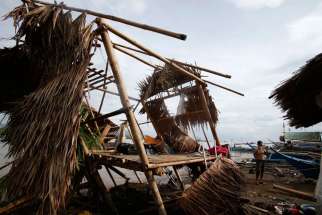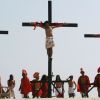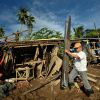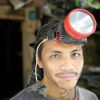Pope Francis departs Aug. 14 on a five-day trip to South Korea, his first to Asia and the start of an important new papal focus on the region: In January, Francis will return to visit Sri Lanka and the Philippines, and a trip to Japan — where the Pope wanted to go as a young priest — is reportedly under consideration.
MANILA, Philippines - Philippine Cardinal Luis Antonio Tagle confirmed July 29 that Pope Francis will visit Jan. 15-19, after spending several days in Sri Lanka.
MANILA, Philippines - An emergency advisor for Catholic Relief Services said many Filipinos learned from Typhoon Haiyan and willingly went to shelters before Typhoon Rammasun struck.
A modern-day debutante
People say age is just a number, but the number 18 screams “stepping into adulthood.” In the Filipino tradition, the tradition of my family, when a young lady turns 18, it’s a huge celebration, which is popularly known as a “debut.”
TORONTO - In the six months since Typhoon Haiyan stripped thousands of Filipinos of everything they have, there is one thing that it couldn’t destroy: the people’s hope and faith in God.
Philippine bishops warn faithful against ritual crucifixions
MANILA, Philippines - Authorities announced that at least 24 "penitents" are expected to be nailed on the cross on Good Friday, an annual ritual meant to atone for sins and give thanks to God for blessings.
Philippine bishops consider Supreme Court appeal for reproductive law
Philippine lawmakers pass reproductive health bill over church protests
Updated 12/17/12
MANILA, Philippines - The Philippine House of Representatives and Senate passed legislation that would promote artificial contraception
Church activists: Lessons from Typhoon Washi helped save Filipino
ILIGAN, Philippines (CNS) -- Although hundreds of people died as Typhoon Bopha hit the southern Philippines
WASHINGTON - The destruction from Typhoon Bopha in portions of Mindanao in the southern Philippines is worse than feared as rescue workers continued to discover bodies under knee-deep mud, said a Catholic Relief Services official coordinating the agency's storm response.
WASHINGTON (CNS) -- As thousands of Philippine families remained in shelters, Catholic Relief Services and Caritas Philippines prepared to speed household supplies and water to eastern sections of Mindanao affected by powerful Typhoon Bopha.
National Geographic story links Philippine priest to ivory smuggling
WASHINGTON - A National Geographic magazine cover story identifies a Philippine Catholic priest accused of sexual abuse in the United States as fueling his country's illegal trade in ivory.
In the course of his research for the October issue, Bryan Christy learned that Msgr. Cristobal Garcia, director of worship for the archdiocese of Cebu, Philippines, had been accused of child sex abuse more than two decades ago but was still serving in priestly ministry.
The article highlights Garcia's extensive ivory religious icon collection and quotes him giving tips on how to smuggle ivory into the Philippines. It also included details of the sexual abuse complaint against him from the 1980s, when he served as a Dominican priest in the archdiocese of Los Angeles. He was expelled from the Dominicans and returned to the Philippines.
In a statement Sept. 26, the Cebu archdiocese said the Vatican had been looking into the sexual abuse complaints against Garcia "long before the (ivory trade) controversy erupted."
"I have also fulfilled the Holy See's instructions regarding submission of documents and acting upon related consequences," Cebu Archbishop Jose Palma said in the statement.
At a news conference the same day, a diocesan official said the Vatican had ordered Garcia suspended from priestly ministry months ago while he is investigated on the charges.
"Let it be made clear that the Church supports the ban on ivory as it is consistent with her doctrine on stewardship of creation," the archbishop's statement said. "The Church does not condone ivory smuggling or other illegal activities, although in the past, ivory was one of the materials used in the adornment of liturgical worship."
The Philippines is a signatory of the international Convention on International Trade of Endangered Species of Wild Fauna and Flora, which means importing ivory to the country is illegal, according to Philippine Bureau of Customs Commissioner Rozzano Rufino Biazon. He explained that anything covered by CITES would have to comply with the country's tariffs and customs code and violations could result in imprisonment of six years.
"And depending on the item that's being imported, applicable laws could bring further penalties to make those longer sentences," said Biazon.
There are also fines, but the bureau's chief of staff of intelligence and investigations, Rainier Ragos, called them "minimal, much less than 100,000 Philippine pesos ($2,400 U.S.)." He said pending legislation in the Philippine congress would impose tougher smuggling fines.
A 2011 Pachyderm Journal article said law enforcement on the ivory trade in the Philippines is "generally poor."
Palma said that religious items made of ivory in the Philippines pre-dated its ban on the trade imposed in 1990.
In the National Geographic article, Christy wrote that the anteroom of Garcia's walled compound is "a mini-museum dominated by large, glass-encased religious figures whose heads and hands are made of ivory: There is an ivory Our Lady of the Rosary holding an ivory Jesus in one, a near-life-size ivory Mother of the Good Shepherd seated beside an ivory Jesus in another. Next to Garcia's desk a solid ivory Christ hangs on a cross."
The article indicates religious practice — Catholic and Buddhist — is a driving force in the desire for ivory.
Christy, who travelled multiple times to Asia for his story, told Catholic News Service in an interview: "In my experience, the devotion to ivory as a religious icon was strongest in the Philippines. In the other places, it was ivory investment even though the image was a religious image, there was ... often a more shallow sort of link, whereas the Filipino collectors that I met truly were devoted."
From 1989 to 2011, more than 40,000 kg of ivory was seized in China, although National Geographic indicated that represents only a fraction of what gets through. The Philippines ranked fifth, at more than 11,000 kg.
The struggle to eradicate ivory smuggling is a deadly one. National Geographic reported that in the first six months of this year, 23 poachers were killed in Kenya. As for casualties on the side of law enforcement in the same time frame, Christy told Catholic News Service that "in Kenya alone a half-dozen (rangers) have been killed, and you can spread that number across Africa. People are killed every year protecting the elephants."
Retired Archbishop Oscar Cruz to continue anti-gambling drive despite death threats
MANILA, Philippines - Outspoken Archbishop Oscar Cruz said he continued to receive death threats because of his campaign against an illegal numbers racket known locally as "jueteng."
The retired archbishop of Lingayen-Dagupan, Philippines, said the most recent threat came in early September, the Asian church news agency UCA News reported.
"I received a check for 80,000 (Philippine) pesos ($1,918) and an envelope containing dried petals," he told a forum in Manila Sept. 18.
"I think it's not that hard to understand what that means," he added. "I used to receive black ribbons cut into pieces."
Philippine criminal syndicates and insurgents are known to threaten potential victims by sending black ribbons, flowers, bullets and even coffins. Such warnings are meant to serve notice for a target to change their ways.
The retired prelate said he was earlier told of a plot to kill him, but he indicated he would not stop his fight against illegal gambling.
"It's hard to fight evil and I'm already old. It's a pity that instead of improving our values we are retrogressing," Archbishop Cruz said.
"I don't think (that this country) is going anywhere," he said.
In 2004, Archbishop Cruz established his anti-gambling group, People's Crusade Against Jueteng, with the aim of stamping out the illegal numbers racket, which is popular with rich and poor alike.
The prelate said jueteng continues to thrive in the country, particularly in the northern provinces of Luzon, and has even invaded schools in metropolitan Manila.
He said the "ballpark figure" that racketeers earn each day from the game is at least $1 million.
Philippine President Benigno Aquino Sept. 17 vowed to eradicate jueteng and ordered a crackdown on small-town lotteries, which he said are being used as fronts for illegal numbers rackets.
Catholic trustee Tobias Enverga elevated to the Senate
TORONTO - For the second time Tobias Enverga has made Canadian political history.
After being the first Filipino-Canadian to hold a publicly elected position in Toronto, the Catholic school trustee has been appointed to the Canadian Senate.
"I'm the first Filipino-Canadian (senator) and we have some unique values that the Senate doesn't have yet and I want to share that," said Enverga, who is now a former Toronto Catholic District School Board trustee after his appointment. "It's a big honour for me and a big honour for our community at the same time."
Prime Minister Stephen Harper's office announced Enverga's election to the Red Chamber on Sept. 7, which fills an Ontario seat vacancy. He, along with four other new senators announced the same day, will officially be sworn in on Sept. 25 in Ottawa.
The five new senators, who have an allegiance to the Conservatives, swells the majority government's chamber representation to 62 in the 105-seat Senate.
When Enverga received the phone call telling him he had been chosen as a senator, he was shocked. Not only did he not know he'd been nominated, Enverga, 56, didn't even really know what a senator did.
"Never in my wildest dreams did I think I was going to be in one of the highest positions in the land," said Enverga. "Like any other new position there will be new challenges. I'm not sure what the new challenges will be because this is the first time that I've heard about the position actually."
But treading unfamiliar waters is nothing new to Enverga, who arrived in Canada in 1981 seeking "adventure and a good job."
Employed by the Bank of Montreal since arriving here, most recently as a project manager, Enverga sought adventure again in 2010 when he ran for Catholic school trustee.
As a senator Enverga had to give his two weeks notice to the bank and resign from his trustee position.
"According to the by-laws I cannot hold two jobs, especially as a senator and trustee," he said.
Although Enverga said he feels bad about leaving the ratepayers who voted for him, this new position will allow him to help a broader range of people. And he believes his experience with the TCDSB can only help him in his new position.
"The good thing is that the Catholic school board has given me the experience to deal with issues and deal with people at the same time," said Enverga, adding that the economy will be a large area of focus while sitting in the Red Chamber. "It's a big challenge but God will not give me anything that I cannot do."
The TCDSB has not decided how it will fill Enverga's seat. It could call a by-election or appoint an interim trustee.
MOUNT DIWATA, Philippines - Daylien Elejorde suspects that mining for gold in the mountains of northern Mindanao is not going to result in a windfall of precious metal.
The small mine she operates with her husband keeps the family fed and a roof over their heads, but not much more. Yet, Elejorde faces losing even the little she has to foreign mining interests eyeing the land and the network of hundreds of hand-excavated tunnels she and her neighbors mine day in and day out.















